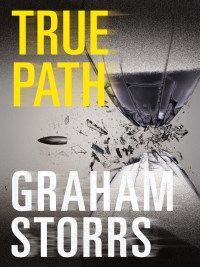Writing time travel stories despite modern physics? "Fudge it or fake it," says author Graham Storrs
Graham Storrs ( @graywave ), a former research scientist and software designer, now lives and writes science fiction in a quiet corner of the Australian bush. In recent years he's published many short stories in magazines and anthologies. His time travel thriller, Timesplash , and its sequel, True Path , are published by Pan Macmillan-Momentum . Here, he blogs for SFX about the problems associated with writing about time travel ...
Writing time travel stories despite modern physics

Let's face it, if we leave it to the physicists, we'll never have time travel.
They speak of theoretical entities such as wormholes that might just give us a passage to different times, if we can hold them open long enough (using another theoretical stuff called negative energy) and if we can drag the end of one around in multi-light-year long loops (using a technology that hasn't even been imagined yet). They mention rotating cages of laser light that can distort spacetime through "frame dragging", but they neglect to mention the infinite amount of that negative energy stuff it would probably require. They might wave their arms a bit and suggest something could be done with tachyons (yet another theoretical entity).
Yet, when pressed, they will probably say only two things that they would be prepared to defend. One is that travel into the future can be achieved by travelling close enough to the speed of light, or being so close to a massive gravity well, that time slows for you (relative to someone outside your inertial frame). But where's the excitement in Rip van Winkelling your way to the future? The other is that travel backwards in time is almost certainly impossible.
But wait, it gets worse.
Sign up to the SFX Newsletter
Get sneak previews, exclusive competitions and details of special events each month!
Never mind mere physics, logic is also against you. There are good reasons for believing time travel in either direction ought to be forbidden by the universe because logical paradoxes can arise if you allow it. You must have heard about the grandfather paradox, created when you go into the past and change things so that you can no longer exist (eg by killing your grandfather before he had any children) and therefore could not have gone into the past to change things. Well, let me introduce you to the granddaughter paradox, where you go into the future before you have any children and meet your own granddaughter who immediately shoots you dead.

Philosophers (and physicists) have tied themselves in knots trying to get around such paradoxes and the consensus, these days, is that you can't. Either the universe will not allow paradoxes even if it does allow time travel (eg however hard you try to shoot old Grandpa, you always miss) or (much simpler) time travel can't exist.
Of course, other cosmologies might exist – like the "many worlds" multiverse – where moving about in time doesn't create paradoxes because you're moving into different versions of the universe which do not interact with the one you started in. (Unfortunately, that "do not interact" clause means that such explanations will forever remain speculation since other universes can never be observed by people in our own.) But that means travelling about in time only takes you to other possible futures or pasts – not necessarily even probable ones. It adds a certain "meh" factor to time travel that makes you wonder why you'd even bother.
It seems that, when it comes to time travel, there is no such thing as hard science fiction. So as a science fiction writer who likes to keep the science real, what can you do when you've got the itch to write a series of time travel novels? Well, it looks like you have two options.
One is to fake it. Just make something up, spout techno-babble (or just babble, like Doctor Who does - "timey-wimey stuff"?), give your protagonist a box to travel in, or a car, or a chair with brass fittings, or a "portal", or some fancy field generator that will hurl them into another time. We all know there's no sound science behind it – it might as well be magic – but if you talk fast and in a loud voice, you can get away with a lot in science fiction.
The other option is to fudge it and take advantage of the uncertainties in the real science. Nobody really knows if there's a singularity at the heart of a black hole – maybe you can push a spaceship through a wormhole after all! And, if you've bent the rules enough to allow faster-than-light travel anyway, well, maybe a FTL slingshot around a star would send your astronauts back in time. Who could argue with you? And as for all that quantum stuff, no-one can make sense of that? Surely somewhere between the uncertainty principle, quantum superposition, and loop quantum gravity, there's room for a chrononaut (with their own Higgs field suppressor) to slip between the cracks and wind up in the 31st century.
The interesting thing is that, while the science can be fudged, the logic can't. Even if our protagonist finds a cool piece of alien tech that can flip them into the past, they still can't shoot their own grandfather – unless the rest of the story is going to be a spaghetti tangle of impossible conundrums from which no reader can escape alive. The real barrier to time travel is not our imagination, but our rationality.
Which is why the smart sci-fi writer fixes things so that if paradoxes do occur, they always end up making a strange kind of sense, bootstrapping the very act that caused the paradox in the first place. But, to be safe you should take a leaf out of Professor Novikov's book and never let a paradox happen in the first place. After all, if you're faking it anyway, why not go the whole hog and create a cosmology in which the universe obligingly prevents any crazy temporal madness for you.
Or, my personal favourite, splash about all you like in the timestream and then make the universe do all the hard work and heal itself. Because of the paradox problems, when you write time travel stories, you inevitably end up building whole cosmologies (whether you know it or not). Which is great, part of the joy of being a sci-fi writer is to play about in cosmological sand-pits and see what you can build there.
This is a guest blog by author Graham Storrs. True Path has recently been shortlisted for an Aurealis Award in the Best Science Fiction Novel category. Graham Storrs has a blog and there is an official page for the Timesplash series . In Doctor Who 's 50th year, SFX published a complete guide to time travel , which you can still order .
SFX Magazine is the world's number one sci-fi, fantasy, and horror magazine published by Future PLC. Established in 1995, SFX Magazine prides itself on writing for its fans, welcoming geeks, collectors, and aficionados into its readership for over 25 years. Covering films, TV shows, books, comics, games, merch, and more, SFX Magazine is published every month. If you love it, chances are we do too and you'll find it in SFX.
Most Popular







